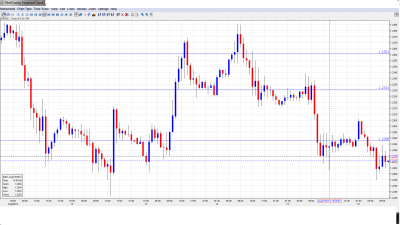EUR/USD was steady, after losing ground yesterday (August 15th). Euro-zone CPI figures were virtually unchanged from July, matching the market forecast. There are three key US releases today, including Unemployment Claims, Building Permits and the Philly Fed Manufacturing Index.
Here’s an update about technical lines, fundamental indicators and sentiment regarding EUR/USD.
EUR/USD Technical
- Asian session: Euro/dollar lost ground, as the pair dropped to 122.60 before consolidating at 1.2267. The pair is unchanged in the European session.
- Current range: 1.22 to 1.2288.
Further levels in both directions:
- Below: 1.22, 1.2144, 1.2043, 1.20, 1.1876 and 1.17.
- Above: 1.2288, 1.2330, 1.2360, 1.24, 1.2440, 1.2520, 1.2623, 1.2670, 1.2743 and 1.2814.
- The pair has broken below 1.2288, which is currently providing weak resistance.
- 1.22 is a strong support level.
Euro/Dollar down slightly following strong US retail sales – click on the graph to enlarge.
EUR/USD Fundamentals
- 9:00 Euro-zone CPI. Exp. +2.4%. Actual +2.4%.
- 9:00 Euro-zone Core CPI. Exp. +1.7%. Actual +1.7%.
- 12:30 US Building Permits. Exp. 0.77M.
- 12:30 US Unemployment Claims. Exp. 365K.
- 12:30 US Housing Starts. Exp. 0.76M.
- 14:00 US Philly Fed Manufacturing Index. Exp. -4.7 points. See how to trade this event with USD/JPY.
- 14:30 US Natural Gas Storage. Exp. 25B.
EUR/USD Sentiment
- Crucial auction gives Greece breathing room: On Tuesday, Greece raised some 4.063 billion euros in a government auction of three-month bonds, with a respectable yield of 4.43%. The sale was much larger than the previous one, and provides crucial funds as the country prepares to make a 3.2 billion euro bond repayment to the ECB later this month as part of the bailout package.
- Greek talks with troika continue: The EU / ECB / IMF delegation left Athens and reported progress in their negotiations with the Greek government. Talks are rescheduled to resume in September, after Greece makes a scheduled bond repayment to the ECB. Greece reported a year over year contraction of “only” 6.2% in Q2, better than 6.5% in Q1, and beating the estimate of 7.0%. When it comes to Greece, the markets appear to be taking the attitude that “less bad news is good news”. See how to trade the Grexit with EUR/USD.
- ECB downgrades EZ growth: In its Monthly Bulletin, the ECB revised its forecast of Euro-zone growth in 2012 from -0.2% to -0.3%. This negative news will increase the pressure on ECB head Mario Draghi to take action, especially regarding Italian and Spanish borrowing costs. Draghi recently declared that bond yields are unacceptable, and that the ECB will explore ways to act in the coming weeks. Italy and Spain want help, but don’t want more conditions and are hesitating before asking for help. Draghi is juggling between the Spanish and Italian desire and strong German opposition to ECB intervention. With the Euro-zone hobbled by 11.2% unemployment, contracting growth and a crippling debt crisis, Europe’s leaders need to bicker less and act more, quickly.
- Talk about QE3 continues: Speculation about QE by the Fed refuses to go away. Boston Federal Reserve President Eric Rosengren recently declared that the Fed should implement QE3 in order to help the troubled US economy. In the meantime, encouraging signs were seen in the US: recent NFP and Retail Sales looked sharp, jobless claims remain low and the trade balance deficit fell to lows last seen at the beginning of 2011. Other market players, however, believe that the QE3 camp seems to miss a simple reality. Fed Chairman Bernanke poured more cold water on QE intervention by the Fed, calling it a program of “diminshing returns”.
- Weakening German economy alarms markets: Recent German economic data has been weak, with PMIs, industrial production and manufacturing orders all disappointing the markets. The markets finally received some good news, as German GDP (first release) was up 0.3%, better than the estimate which stood at 0.2%. However, German ZEW Economic Sentiment fell sharply to -25.5 points, its worst showing this year. Germany is not immune to the Euro-zone crisis.
- Italian economy sputtering: Borrowing costs rose after Italy auctioned the full targeted amount of EUR8 billion of one-year government bonds at a yield of 1.69%. This was up from the previous auction, which netted a yield of 1.55%. The economic picture in Italy is grim, as the country is carrying a debt-to-GDP ratio of 123%, and with another GDP decline, has officially been in recession for one full year. The Italian PM Mario Monti has been very active of late, but his popularity in Italy is diminishing, and he also managed to anger the Germans by taking a swipe and dismissing the importance of the Bundestag.

